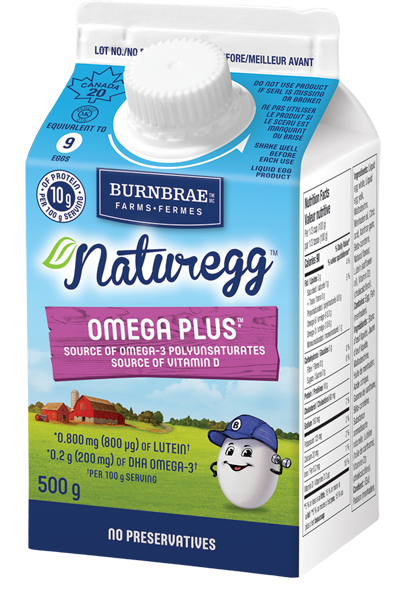Naturegg Omega Plus
Lower in cholesterol and fat than regular eggs.

Lower in cholesterol and fat than regular eggs.

Omega Plus eggs are a source of DHA and EPA omega-3 fatty acids and lutein that support heart and eye health, and several other health benefits. To add omega-3, our hens are fed an all-natural, flax-based diet including omega oils developed by researchers at the University of Guelph. Lutein is added by including crushed marigold flowers to the hen's diet.
Naturegg Omega Plus Liquid Eggs are lower in cholesterol and fat than regular eggs and contain heart-healthy omega-3 polyunsaturates. Omega-3 polyunsaturates are important for maintaining overall good health.
Eight tablespoons or 100 mL of Naturegg Omega Plus Liquid Eggs contain 40% of the daily requirement of omega-3 polyunsaturated fats. Omega-3 fats are needed for children’s normal growth and development and to help maintain good health throughout life. Since our bodies cannot make the essential omega-3 fats we need, food sources are an important part of healthy eating.
Ingredients:
Egg whites, egg yolks, maltodextrin, menhaden oil (fish oil), citric acid, xanthan gum, beta carotene, natural flavour, lutein (safflower oil), vitamin D3
Tip: Use within 5-7 days of opening, before expiry date. Can be frozen for up to 3 months, if frozen before expiry date. Once opened, use within 5-7 days.
Naturegg Omega Plus Liquid Eggs can be used anywhere regular shell eggs are used. Use in baking, as a substitute for whole beaten egg in most breakfast dishes (i.e. omelettes), as a low fat protein source or, because it is pasteurized, to add protein and a frothy texture to healthy fruit drinks. Naturegg Omega Plus Liquid Eggs can also be frozen before its best before date for up to 3 months . When ready to use, just thaw, shake and pour.
Naturegg Omega Plus Liquid contains even more of the long-chain omega-3 fatty acids EPA and DHA than Naturegg Omega Plus shell eggs. Each 2 egg serving of Omega Plus Liquid eggs has 250 mg DHA omega-3 plus 250 mg EPA omega-3 which adds up to a total of 500 mg of these long-chain omega-3s.
While it’s good to enjoy sources of all three omega-3 fats, ALA, EPA and DHA as part of a healthy diet, it’s important to realize Canadian’s generally get enough of the short-chain omega-3 ALA (found in many plant sources) but many people miss the mark when it comes to getting enough of the long-chain omega-3 EPA and DHA from fatty fish.
Although our bodies can convert some of the short chain omega-3 ALA into the physiologically important longer-chain EPA and DHA, this conversion is very limited (usually less than 10%).
Naturegg Omega Plus Liquid eggs are a great option to help fill the EPA and DHA omega-3 gap!
Omega-3 fats are an important factor for good health throughout life. In the early years, omega-3 fats are recognized as particularly vital for heathy growth and development.
There are three main types of omega-3 fats in foods:
While ALA is considered essential, most people likely get enough of this omega-3 fat because it is found in many plant foods including nuts and seeds like walnuts and flaxseeds and vegetable oils like canola oil.
It is especially important to focus on getting enough of DHA and EPA omega-3s. That’s because many people likely don’t get enough of these long-chain omega-3 fats found primarily in fatty fish like salmon.
The omega-3 fatty acid DHA supports the normal physical development of the brain, eyes and nerves primarily in children under two year of age. The Institute of Medicine that sets nutrition recommendations for Canadians stated that "The developing brain accumulates large amounts of DHA during the pre- and postnatal development and this accumulation continues throughout the first 2 years after birth".1
Dietitians of Canada suggest that healthy adults aim for a daily DHA + EPA omega-3 intake of 500 mg.2
Canada’s Food Guide also recommends two 75 g servings of fatty fish per week to get these Omega-3s.
Since Naturegg Omega-3 eggs are enhanced with DHA, they’re a convenient option to help to fill the gap between intakes and needs.
Learn more about your needs and food sources of omega-3 fats.
(per 100g (1/3 cup) serving)
Per 1/3 cup (100g)